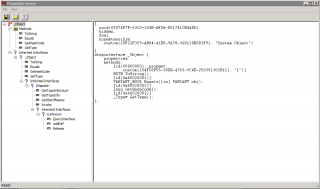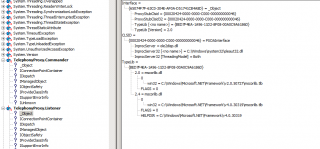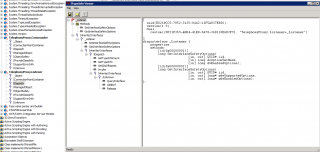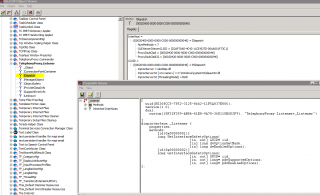
Basti756
Active Members-
Posts
22 -
Joined
-
Last visited
Basti756's Achievements

Seeker (1/7)
0
Reputation
-
ObjEvent not executing function
Basti756 replied to Basti756's topic in AutoIt General Help and Support
I didn't get that IsObj() is able to check for exisiting objects on ObjEvent(), altough ObjEvent() creates an object... anyways. @error from ObjEvent is -2147319785 and (as a result) the object is not created. -2147319785 means 'Field name not defined in the record' -
ObjEvent not executing function
Basti756 replied to Basti756's topic in AutoIt General Help and Support
Sorry for bumping this thread but I still can't figure out why my script isn't working -
ObjEvent not executing function
Basti756 replied to Basti756's topic in AutoIt General Help and Support
-
ObjEvent not executing function
Basti756 replied to Basti756's topic in AutoIt General Help and Support
Any hint on what I should look for? I've never done anything like that... EDIT: Maybe the attached screenshot helps altough it shows only slightly more than the previous one. -
ObjEvent not executing function
Basti756 replied to Basti756's topic in AutoIt General Help and Support
I updated AutoIt to 3.3.8.1 yesterday. 3.3.6.1 was for testing only. $sLocation returns an empty string. It seems like flag 4 is not supported by the object. Is there any other way to get this information? EDIT: ObjName doesn't return an error and flag 1 is returning the object's name. EDIT2: This is what is being returned by all flags of ObjName: 1: Listener 2: 3: TelephonyProxy.Listener 4: 5: C:\Windows\Microsoft.NET\Framework\v4.0.30319\clr.dll 6: {CE21C9EE-6671-4B1C-8B01-D7AA4C52CB6C} 7: {E0268CC5-7852-3125-8442-11F5A837E806} -
ObjEvent not executing function
Basti756 replied to Basti756's topic in AutoIt General Help and Support
No but it doesn't work either. There is just a message box popping up saying 'No MSFT Typelib inside this file!'. -
ObjEvent not executing function
Basti756 replied to Basti756's topic in AutoIt General Help and Support
I'm currently running 3.3.6.1 because I read something about changes within the COM handling after that version. Before I was using 3.3.8.1. I already tried the latest beta (3.3.9.4) as well. -
I'm trying to receive events about incoming calls from a VoIP software (Mitel UC Advanced - in case somebody wants to know). There is a SDK available which consists of one DLL file (TelephonyProxy.dll). The documentation of the DLL file says the following about the Offering event: Visual Basic example: Public Class Listener Offering event in detail: Visual Basic example: Public Event Offering As Listener.OfferingEventHandler Delegation in Visual Basic: Public Delegate Sub OfferingEventHandler ( _ name As String, _ number As String _ ) This is what I produced in AutoIt based on the documentation: Local $oError = ObjEvent("AutoIt.Error", "nothing") $oPhone = ObjCreate("{CE21C9EE-6671-4B1C-8B01-D7AA4C52CB6C}") $oPhoneEvent = ObjEvent($oPhone,"_PhoneEvent_") MsgBox(0,"isObj",IsObj($oPhone)) While 1 Sleep(100) WEnd Func _PhoneEvent_Offering($name,$number) MsgBox(0,"",$name & " " & $number) EndFunc The problem is that the function '_PhoneEvent_Offering' is not executed on incoming calls. The object on the other hand is created (returns 1). The DLL's interface fullfills the requirements of AutoIt for working with it as far as I know. The 'oleviewer.exe' shows the IDispatch-interface under 'Telephony.Proxy' (see attached screenshot). There are other API options in the DLL file, i.e. dialing a number. This works as desired so I bet I'm missing something with the ObjEvent stuff. Any help is appreciated. Thanks, Bastian EDIT: When using an object to fetch possible errors I always get this on the console: err.number is: -2147319785 err.windescription: Field name not defined in the record
-
First of all sorry for the messed up posts. I know about the registry functions but integrating the files within the script would have saved me a lot of work. That was before I knew about Reg2Au3 . There is also an answer file for a unattended Oracle Client installation which I wanted to be integrated (which gets messed up too BTW) but I think I'll rather use AutoIt's native functions. Back to topic: Did you experience this behavior of FileInstall()? Here's what I did: using FileInstall() to integrate some files <- OKfiles being extracted when running the script <- OKfile content after they've been extracted <- NOKThe strange thing is I integrated 3 REG files, the Oracle answer file and a small MSI file. After they'd been extracted, they were all the same size (around 855kb) and looking at them with a text editor would show what I wrote in my second post. I'm using Windows Server 2008 R2 SP1 (which is a 64Bit OS) for compiling. Could that be the reason? EDIT: This is embarrassing now... the issues I had with FileInstall() turned out to be one of those copy-paste-errors. Here's what I did: FileInstall("C:some.msi",@TempDir & "some.msi")I needed a couple of files included so I copied and pasted this line a few times and changed the target path... not the source: FileInstall("C:some.msi",@TempDir & "some.msi") FileInstall("C:some.msi",@TempDir & "first.reg") FileInstall("C:some.msi",@TempDir & "second.reg")No wonder that the extracted files were totally messed. Thanks anyways, Bastian
-
The boardsoftware somehow messes with my code snippet. Here's a part of the mentioned result: ÐÏࡱá > þÿ z þÿÿÿ € ÿ € ÿ € ÿ € ÿ € ÿ € ÿ € ÿÿÿÿÿÿÿÿÿÿÿÿÿÿÿÿÿÿÿÿÿÿÿÿÿÿÿÿÿÿÿÿÿÿÿÿÿÿÿÿÿÿÿÿÿÿÿÿÿÿÿÿÿÿÿÿÿÿÿÿÿÿÿÿÿÿÿÿÿÿÿÿÿÿÿÿÿÿÿÿÿÿÿÿÿÿÿÿÿÿÿÿÿÿÿÿÿÿÿÿÿÿÿÿÿÿÿÿÿÿÿÿÿÿÿÿÿÿÿÿÿÿÿÿÿÿÿÿÿÿÿÿÿÿÿÿÿÿÿÿÿÿÿÿÿÿÿÿÿÿÿÿÿÿÿÿÿÿÿÿÿÿÿÿÿÿÿÿÿÿÿÿÿÿÿÿÿÿÿÿÿÿÿÿÿÿÿÿÿÿÿÿÿÿÿÿÿÿÿÿÿÿÿÿÿÿÿÿÿÿÿÿÿÿÿÿÿÿÿÿÿÿÿÿÿÿÿÿÿÿÿÿÿÿÿÿÿÿÿÿÿÿÿÿÿÿÿÿÿÿÿÿÿÿÿÿÿÿÿÿÿÿÿÿÿÿÿÿÿÿÿÿÿÿÿÿÿÿÿÿÿÿÿÿÿÿÿÿÿÿÿÿÿÿÿÿÿÿÿÿÿÿÿÿÿÿÿÿÿÿÿÿÿÿÿÿÿÿÿÿÿÿÿÿÿÿÿÿÿÿÿÿÿÿÿÿÿÿÿÿÿÿÿÿÿÿÿÿÿÿÿÿÿÿÿÿÿÿÿÿÿÿÿÿÿÿÿÿÿÿÿÿÿÿÿÿÿÿÿÿýÿÿÿ › , ! " # $ % & ' ( ) * + . - D / 0 1 2 3 4 5 6 7 8 9 : ; < = > ? @ A B C F þÿÿÿþÿÿÿG H I J K L M N O P Q R S T U V W X Y Z [ ] ^ _ ` a b c d e f g h i j k l m n o p q s t u v w x y E ¢ | } ~ R o o t E n t r y ÿÿÿÿÿÿÿÿ „ À F àoËÐQÌ{ @ @HŒDðDrDhD7H ÿÿÿÿÿÿÿÿÿÿÿÿ O @HC5BæErE<H ÿÿÿÿ N @HBäExE(H ÿÿÿÿ M @HBäExE(;2D³D1BñE6H ÿÿÿÿ L @HC/B ÿÿÿÿÿÿÿÿÿÿÿÿ F V @HDñE ÿÿÿÿ D L @HRDöEäC¯;;B&F7BB4FhD&B ÿÿÿÿ ÿÿÿÿ = Œ @HB'C$H ÿÿÿÿÿÿÿÿÿÿÿÿ 3 @H–Eì;ìCh<¤E+H ÿÿÿÿÿÿÿÿÿÿÿÿ 7 | @HYEòDhE7G ÿÿÿÿ ÿÿÿÿ 4 ˜ @Hÿ?äCìAäE¬D1H ÿÿÿÿ ƒ Ð) @H?dA/B6H ÿÿÿÿÿÿÿÿ 1 T @HÊA0C±;;B&F7BB4FhD&B ÿÿÿÿÿÿÿÿ 0 0 @HÊAùEÎF¨AøE(?(E8B±A(H ÿÿÿÿ . T @HŠA7CrDBûE ÿÿÿÿÿÿÿÿÿÿÿÿ ' ¤ @HNEµD5H ÿÿÿÿ x @H?;òC8D±E ÿÿÿÿÿÿÿÿÿÿÿÿ @H??wElDj>²D/H ÿÿÿÿÿÿÿÿÿÿÿÿ r @H??wElDj;äE$H ÿÿÿÿ PÔ WIPROPDriveQR:WIPROPDriveRS:WIPROPDriveST:WIPROPDriveTU:WIPROPDriveUV:WIPROPDriveVW:WIPROPDriveWX:WIPROPDriveXY:WIPROPDriveYZ:WIPROPDriveZWICOMP00000001WIFEAT00000001New FeatureSourceDirTARGETDIR{E2C7F2EC-CFAA-437B-BC86-9B2F410D048C}WIRemoveTextFileRemoveTextFilePositionTextAltPositionTextRemovalTextWinINSTALL: Primary key, non-localized token.WinINSTALL: File name used for installation, may be localized. This may contain a "short name|long name" pair.WinINSTALL: Foreign key into the Directory table denoting the directory where the text file is.WinINSTALL: Primary text removal position enumeration.WinINSTALL: Alternate text removal position enumeration.WinINSTALL: Text to be removed.WinINSTALL: Text removal action enumeration.WinINSTALL: Foreign key into the Component table referencing component that controls the removal of the text.WITextFileTextFileInsertionTextWinINSTALL: Primary text installation position enumeration.WinINSTALL: Alternate text installation position enumeration.WinINSTALL: Text rner of the bounding rectangle of the control.Vertical coordinate of the upper left corner of the bounding rectangle of the control.The name of an action. The billboard is displayed during the progress messages received from this action.Name of the billboard.An external key to the Feature Table. The billboard is shown only if this feature is being installed.OrderingA positive integer. If there is more than one billboard corresponding to an action they will be shown in the order defined by this column.The unformatted binary data.Unique key identifying the binary data.The index into the File table. This must be an executable file.PathPathsA list of ; delimited paths that represent the paths to be searched for the import DLLS. The list is usually a list of properties each enclosed within square brackets [] .CheckBoxA named property to be tied to the item.The value string associated with the item.Optional AppID containing DCOM information for associated application (string GUID).optional argument for LocalServers.Class registration attributes.The CLSID of an OLE factory.Required foreign key into the Component Table, specifying the component for which to return a path when called through LocateComponent.The numeric server context for this server. CLSCTX_xxxxFilename1;2;3Optional default inproc handler. Only optionally provided if Context=CLSCTX_LOCAL_SERVER. Typically "ole32.dll" or "mapi32.dll"Localized description for the Class.Required foreign key into the Feature Table, specifying the feature to validate or install
-
Hi, I made a script which installs an application and its dependencies. There are a few .reg files and a .msi file which I wanted to include in the script. Inlcuding the files with FileInstall() works, but they are kinda messed up when the compiled script is executed. It somehow looks like those files have been compiled to binary. Here's what one of the .reg files looks before compiling the script: Windows Registry Editor Version 5.00 [HKEY_LOCAL_MACHINE\SOFTWARE\WOW6432Node\VAG\\update\Columns\0000] "Item"="ProgDesc" "Name"="Name" "Section"="Name" "ColID"=dword:00000000 "Sort"=dword:00000001 "Width"=dword:000000f7 This is what the file looks when being extracted by FileInstall() (just a part of it): ÐÏࡱá > þÿ z þÿÿÿ € ÿ € ÿ € ÿ € ÿ € ÿ € ÿ € ÿÿÿÿÿÿÿÿÿÿÿÿÿÿÿÿÿÿÿÿÿÿÿÿÿÿÿÿÿÿÿÿÿÿÿÿÿÿÿÿÿÿÿÿÿÿÿÿÿÿÿÿÿÿÿÿÿÿÿÿÿÿÿÿÿÿÿÿÿÿÿÿÿÿÿÿÿÿÿÿÿÿÿÿÿÿÿÿÿÿÿÿÿÿÿÿÿÿÿÿÿÿÿÿÿÿÿÿÿÿÿÿÿÿÿÿÿÿÿÿÿÿÿÿÿÿÿÿÿÿÿÿÿÿÿÿÿÿÿÿÿÿÿÿÿÿÿÿÿÿÿÿÿÿÿÿÿÿÿÿÿÿÿÿÿÿÿÿÿÿÿÿÿÿÿÿÿÿÿÿÿÿÿÿÿÿÿÿÿÿÿÿÿÿÿÿÿÿÿÿÿÿÿÿÿÿÿÿÿÿÿÿÿÿÿÿÿÿÿÿÿÿÿÿÿÿÿÿÿÿÿÿÿÿÿÿÿÿÿÿÿÿÿÿÿÿÿÿÿÿÿÿÿÿÿÿÿÿÿÿÿÿÿÿÿÿÿÿÿÿÿÿÿÿÿÿÿÿÿÿÿÿÿÿÿÿÿÿÿÿÿÿÿÿÿÿÿÿÿÿÿÿÿÿÿÿÿÿÿÿÿÿÿÿÿÿÿÿÿÿÿÿÿÿÿÿÿÿÿÿÿÿÿÿÿÿÿÿÿÿÿÿÿÿÿÿÿÿÿÿÿÿÿÿÿÿÿÿÿÿÿÿÿÿÿÿÿÿÿÿÿÿÿÿÿÿÿÿÿÿýÿÿÿ › , ! " # $ % & ' ( ) * + . - D / 0 1 2 3 4 5 6 7 8 9 : ; < = > ? @ A B C F þÿÿÿþÿÿÿG H I J K L M N O P Q R S T U V W X Y Z [ \ ] ^ _ ` a b c d e f g h i j k l m n o p q s t u v w x y E ¢ | } ~ R o o t E n t r y ÿÿÿÿÿÿÿÿ „ À F àoËÐQÌ{ @ @HŒDðDrDhD7H ÿÿÿÿÿÿÿÿÿÿÿÿ O @HC5BæErE<H ÿÿÿÿ N @HBäExE(H ÿÿÿÿ M @HBäExE(;2D³D1BñE6H ÿÿÿÿ L @HC/B ÿÿÿÿÿÿÿÿÿÿÿÿ F V @HDñE ÿÿÿÿ D L @HRDöEäC¯;;B&F7BB4FhD&B ÿÿÿÿ ÿÿÿÿ = Œ @HB'C$H ÿÿÿÿÿÿÿÿÿÿÿÿ 3 @H–Eì;ìCh<¤E+H ÿÿÿÿÿÿÿÿÿÿÿÿ 7 | @HYEòDhE7G ÿÿÿÿ ÿÿÿÿ 4 ˜ @Hÿ?äCìAäE¬D1H ÿÿÿÿ ƒ Ð) @H?dA/B6H ÿÿÿÿÿÿÿÿ 1 T @HÊA0C±;;B&F7BB4FhD&B ÿÿÿÿÿÿÿÿ 0 0 @HÊAùEÎF¨AøE(?(E8B±A(H ÿÿÿÿ . T @HŠA7CrDBûE ÿÿÿÿÿÿÿÿÿÿÿÿ ' ¤ @HNEµD5H ÿÿÿÿ x @H?;òC8D±E ÿÿÿÿÿÿÿÿÿÿÿÿ @H??wElDj>²D/H ÿÿÿÿÿÿÿÿÿÿÿÿ r @H??wElDj;äE$H ÿÿÿÿ PÔ \WIPROPDriveQR:\WIPROPDriveRS:\WIPROPDriveST:\WIPROPDriveTU:\WIPROPDriveUV:\WIPROPDriveVW:\WIPROPDriveWX:\WIPROPDriveXY:\WIPROPDriveYZ:\WIPROPDriveZWICOMP00000001WIFEAT00000001New FeatureSourceDirTARGETDIR{E2C7F2EC-CFAA-437B-BC86-9B2F410D048C}WIRemoveTextFileRemoveTextFilePositionTextAltPositionTextRemovalTextWinINSTALL: Primary key, non-localized token.WinINSTALL: File name used for installation, may be localized. This may contain a "short name|long name" pair.WinINSTALL: Foreign key into the Directory table denoting the directory where the text file is.WinINSTALL: Primary text removal position enumeration.WinINSTALL: Alternate text removal position enumeration.WinINSTALL: Text to be removed.WinINSTALL: Text removal action enumeration.WinINSTALL: Foreign key into the Component table referencing component that controls the removal of the text.WITextFileTextFileInsertionTextWinINSTALL: Primary text installation position enumeration.WinINSTALL: Alternate text installation position enumeration.WinINSTALL: Text rner of the bounding rectangle of the control.Vertical coordinate of the upper left corner of the bounding rectangle of the control.The name of an action. The billboard is displayed during the progress messages received from this action.Name of the billboard.An external key to the Feature Table. The billboard is shown only if this feature is being installed.OrderingA positive integer. If there is more than one billboard corresponding to an action they will be shown in the order defined by this column.The unformatted binary data.Unique key identifying the binary data.The index into the File table. This must be an executable file.PathPathsA list of ; delimited paths that represent the paths to be searched for the import DLLS. The list is usually a list of properties each enclosed within square brackets [] .CheckBoxA named property to be tied to the item.The value string associated with the item.Optional AppID containing DCOM information for associated application (string GUID).optional argument for LocalServers.Class registration attributes.The CLSID of an OLE factory.Required foreign key into the Component Table, specifying the component for which to return a path when called through LocateComponent.The numeric server context for this server. CLSCTX_xxxxFilename1;2;3Optional default inproc handler. Only optionally provided if Context=CLSCTX_LOCAL_SERVER. Typically "ole32.dll" or "mapi32.dll"Localized description for the Class.Required foreign key into the Feature Table, specifying the feature to validate or install The OS I'm using for compiling is Windows 7 SP1 x64
-
Hi, I'm looking for an automated way to edit a file with a hex editor and I wondered if there's any possibility to use AutoIt for that. It's always the same unicode string which occurs 3 times and which has to be replaced. The point is that the file has around 2GB which doesn't work with most of the editors around. So I'm looking for an UDF which might help me out. Another way would be something like a commandline hex editor but I couldn't find anything like that. Right now I'm using HxD to replace the string manually since this seems to be the only editor which is able to handle a 2GB file. Any idea is welcome Bastian
-
Thanks a lot. You made my day >_
-
Hi, I'm trying to create a GUI with several labels on it. The labels should be created dynamically, depeding on the key/value pairs of a section of an INI file. Here's the code I got so far: #include <GUIConstantsEx.au3> #include <Array.au3> Opt("GUIOnEventMode", 1) $x = @DesktopWidth $y = @DesktopHeight $a = 15 GUICreate("",$x,$y,0,0) GUISetOnEvent($GUI_EVENT_CLOSE, "CLOSEClicked") $aUserNames = IniReadSection ("users.ini","users") _ArrayDisplay ($aUserNames) For $i=1 To $aUserNames[0][0] For $a=15 To $y-200 Step 15 GUICtrlCreateLabel ($aUserNames[$i][1], 10,$a,100,30) Next Next GUISetState (@SW_SHOW) While 1 Sleep (1000) Wend Func CLOSEClicked() Exit EndFunc The problem I'm having is that only the last value of the INI file is displayed - even more than . I bet I did something like that once before but I can't remember how. So if somebody could point me to the right direction please? >_< Thanks in advance
-
That might be a reason. I'll give it a try Thanks Well... unfortunately that didn't work. Maybe there's something wrong with the dll files?




